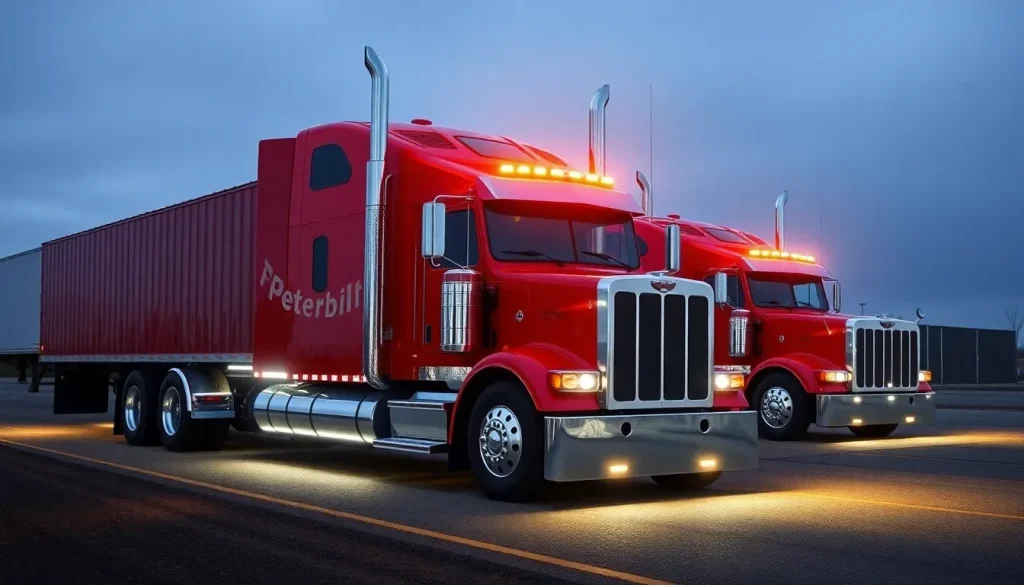Peterbilt starts Class 8 truck production for Canada in St. Therese

In a significant step towards enhancing its operations in Canada, Peterbilt has announced the production of its first Model 567 at the Paccar manufacturing facility located in Sainte-Thérèse, Quebec. This development not only underscores the company’s commitment to local manufacturing but also aims to cater to the growing demand for Canadian-made trucks among local customers.
This move is not merely about producing trucks; it's about creating a connection with the Canadian market. As the demand for heavy-duty trucks continues to rise, the ability to manufacture these vehicles on Canadian soil is a game changer for the industry.
Understanding Peterbilt's Local Production Strategy
Peterbilt’s decision to expand its production capabilities in Canada illustrates a strategic shift towards localized manufacturing. Tina Albert, assistant general manager of operations for Peterbilt, emphasized the importance of this strategy: “Peterbilt’s flexible manufacturing strategy enables us to manufacture trucks locally in the markets in which they are sold.” This approach allows the company to:
- Respond more swiftly to market demands.
- Reduce transportation costs and time.
- Support local economies by creating jobs.
By transitioning from only producing medium-duty trucks to incorporating heavy-duty models like the Model 567, Peterbilt is positioning itself to better serve the Canadian market. The company also hinted at future plans to include electric vehicles in their production line, aligning with the increasing push for sustainable transportation solutions.
The Significance of the Model 567 for Canadian Customers
The Model 567 represents a crucial addition to Peterbilt's offerings, especially for Canadian businesses. This truck is tailored to meet the unique demands of the Canadian market, particularly in industries such as environmental management. The first delivery of this model was made to Environmental 360 Solutions (E360S), a company based in Ontario, marking a milestone in both Peterbilt's and E360S's operational journeys.
According to Danny Ardellini, founder and CEO of E360S, the delivery of the Model 567 signifies a pivotal moment for their operations. He stated, “As a trusted Canadian environmental management company, taking delivery of the first Peterbilt Model 567 built in Sainte-Thérèse represents a proud milestone for us, especially as Quebec accounts for 37% of our business.” This reflects the strong relationship between local manufacturers and businesses aiming for environmentally responsible solutions.
Impact on the Canadian Economy and Workforce
The establishment of production capabilities for heavy-duty trucks in Canada not only caters to immediate customer needs but also has broader implications for the local economy. By manufacturing trucks locally, Peterbilt is making a concerted effort to:
- Generate employment opportunities for local residents.
- Enhance the skills of the manufacturing workforce through training and development.
- Boost local suppliers and service providers in the trucking industry.
This emphasis on local production resonates with Canadian consumers who increasingly prefer to support homegrown businesses. The synergy between Peterbilt's manufacturing strategy and the qualities of the Model 567 creates a compelling narrative for Canadian customers seeking reliable, efficient, and sustainable transportation solutions.
The Future of Truck Manufacturing in Canada
As the trucking industry evolves, the need for innovation and adaptability becomes more pronounced. Peterbilt's commitment to producing trucks in Canada is a promising sign of the future direction of the industry. This production shift points towards several trends:
- Customization: Enhanced ability to customize vehicles according to local needs.
- Sustainability: Increased focus on electric and hybrid models to meet environmental standards.
- Technological Integration: Incorporating advanced technologies for improved performance and safety features.
With these developments, Peterbilt not only addresses the current demands of the market but also prepares for future challenges in the trucking industry.
Engagement with Local Communities
Peterbilt's operations in Sainte-Thérèse go beyond just manufacturing; they also involve engaging with the local community. This initiative demonstrates the company’s dedication to corporate social responsibility, which includes:
- Investing in local educational programs.
- Partnering with community organizations for environmental initiatives.
- Creating a positive impact on the local economy by sourcing materials locally.
Such efforts foster goodwill and strengthen the relationship between Peterbilt and the communities where they operate, ensuring a mutually beneficial partnership.
To further explore the significance of Class 8 trucks and their role in the Canadian market, check out this insightful video:
As the landscape of the trucking industry continues to change, Peterbilt's innovative approach and commitment to local production in Canada is setting a new standard. The company's ability to adapt to market needs while supporting the local economy positions it as a leader in the heavy-duty truck manufacturing sector.




Leave a Reply